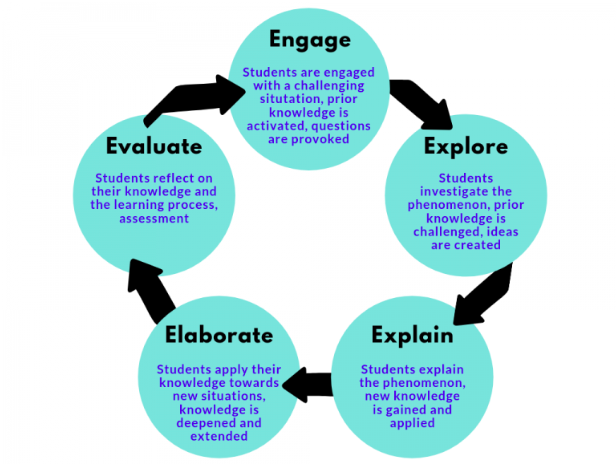What is Inquiry-Based Learning?
Inquiry-based learning is an approach to learning that emphasizes the student’s role in the learning process by encouraging them to take responsibility for their own learning and arrive at an understanding of concepts by themselves. This process is guided however, gradually increases independent investigation of questions and problems, often with no one answer.
This approach is based on John Dewey’s philosophy that “education begins with the curiosity of the learner”. Independent inquiry is culminated through experiential learning because it values the same concepts, which include engaging with the material in questioning as well as investigating and collaborating to make meaning. This is how inquiry-based learning stems from constructivism and reflects Vygotsky’s approach to constructivism.
This approach fosters critical thinking skills, curiosity and a sense of accomplishment in the learner by developing skills such as: asking good questions, identifying what needs to be learned and what resources that are needed, and how to share their learning or findings with others.
Teachers should be encouraging divergent thinking, allow students the freedom to ask their own questions, and to learn effective strategies for discovering the answers.
Transferable Skills:
- Realistic goal-setting and goal-tracking
- Time- and priority-management
- Information gathering, filtering, and integration
- Critical thinking
- Communication of ideas and learning
- Self-assessment and reflection
There are four key elements at the core of inquiry-based learning as described by Queens University
- Inquire: ask questions, discuss, reformulate
- Research & Reflect: identify resources, access knowledge
- Evaluate: Do the resources address the questions? Do they raise new questions?
- Construct: reformulate, re-examine, synthesize
These key elements are found in The 5E Inquiry-Based Instructional Model. This model is based on cognitive psychology and constructivist theory to learning.

Does This Approach Align With Our Topic?
Inquiry-based learning can be applied across many fields. It can be adapted to each individual’s learning experience and supports long-lasting core skills for student success. Some areas where inquiry-based learning can thrive include but are not limited to formats such as: fieldwork, case studies, investigations, individual and group projects, and research projects.
That being said, inquiry-based learning can be directly applied to our group’s chosen learning resource topic, ChatGPT. Reasons that it can connect to our topic include:
- Modules within our Interactive Learning Resource are based upon the constructivist learning theory and approaches.
- The learner is at the centre of this learning resource. The activities, questions, and big ideas support the learners overall understanding.
- This resource focuses on supporting learners to effectively engage with AI language models, critically evaluate their outputs, and use them responsibly.
- Learners can make informed decisions when interacting with AI language models in various domains by asking good questions, identifying what needs to be learned and what resources that are needed, and how to share their learning or findings with others.
- The learner will engage in demonstrations that are interactive therefore fostering critical thinking skills and curiosity.
- The majority of the learning assessments are designed using constructivist approaches such as: group inquiry, evaluation, discussion, presentation of findings, self-reflection, and further inquiry.
Remember To Keep In Mind…
Don’t wait for the perfect question
Place ideas at the centre
Work towards common goal of understanding
Don’t let go of the class
Remain true to the students’ line of inquiry
Teach directly on a need-to-know basis
Resources
Jacqueline M. DiSanto, H. C. C. (n.d.). Foundations of Education. Lumen. https://courses.lumenlearning.com/olemiss-education/chapter/inquiry-based-learning/
Sam Northern, Ed. D. (2019, August 27). The 5 E’s of inquiry-based learning. https://knowledgequest.aasl.org/the-5-es-of-inquiry-based-learning/
Queens University. (n.d.). Inquiry-Based Learning. Centre for Teaching and Learning. https://www.queensu.ca/ctl/resources/instructional-strategies/inquiry-based-learning
conormcgregor
June 4, 2023 — 9:54 pm
I think you have done a great job explaining inquiry-based learning, and I also enjoyed the last part about “Remember To Keep In Mind. ” Each point you made was interesting and well addressed in your post. The point of not waiting for the perfect question is very accurate because I feel that a “perfect question” never arises. Also, placing ideas at the centre is also important in this form of learning so you can always keep focused on the idea and not sway away from the main topic. My favourite would probably be “teach directly on a need-to-know basis.” This is my favourite because I enjoy doing this and learning this way; I feel like there is not a lot of time to waste and doing it intentionally is not the right way to go about things.
“Remember To Keep In Mind…”
Don’t wait for the perfect question
Place ideas at the centre
Work towards common goal of understanding
Don’t let go of the class
Remain true to the students’ line of inquiry
Teach directly on a need-to-know basis
madisoncartr
June 6, 2023 — 1:50 pm
https://madisoncartr.opened.ca/2023/06/06/blogpost-2-comment/